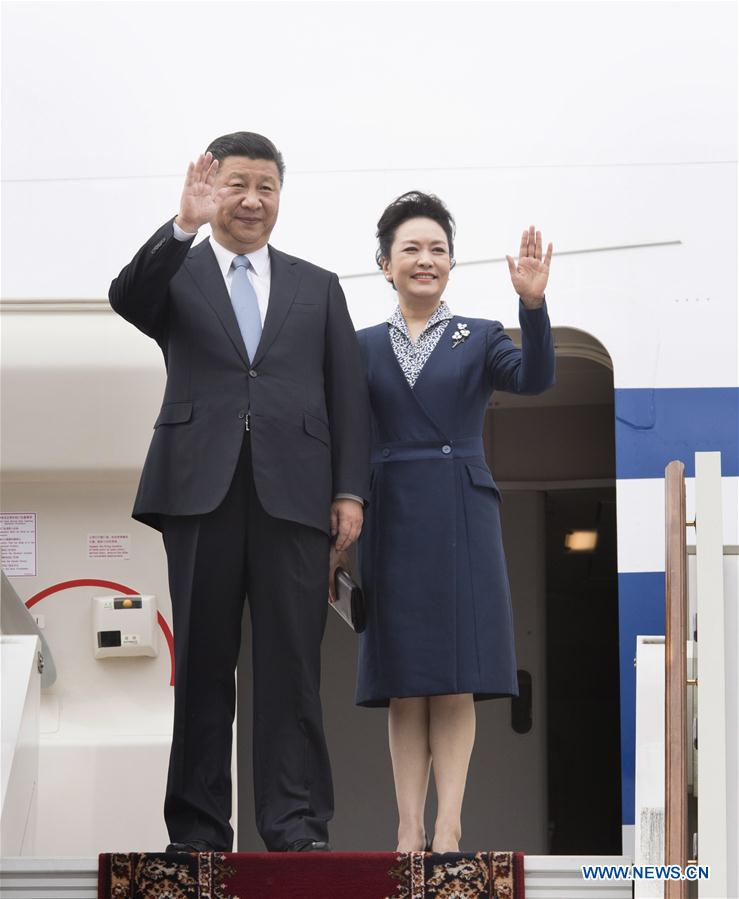Xi arrives in Moscow for state visit to Russia
Chinese President Xi Jinping arrived in Moscow on Monday, embarking on his second state visit to Russia since taking office in 2013.
|
Chinese President Xi Jinping and his wife Peng Liyuan arrive in Moscow, Russia, July 3, 2017. Xi embarks on a state visit to Russia. (Xinhua/Li Xueren) |
In a written speech released upon arrival, Xi noted that the China-Russia comprehensive strategic partnership of coordination is at its best in history.
The Chinese top leader said the two countries, both staunch supporters of each other's core interests, have engaged in aligning the China-proposed Belt and Road Initiative with the Russia-led Eurasian Economic Union.
Beijing and Moscow, faced with complicated international situation, have played their due role in promoting win-win cooperation in international relations, and securing regional and global peace and stability, he said.
"This is my sixth tour to Russia since assuming office," Xi said, adding that he looks forward to in-depth exchange of views with his Russian counterpart, Vladimir Putin, on bilateral cooperation and major international and regional issues of common concern.
"One needs good partners to walk with, and good neighbors to live with," he noted.
Xi will hold talks with top Russian leaders during his stay, in a bid to deepen political trust and map out the future bilateral cooperation, Chinese Assistant Foreign Minister Li Huilai said at an earlier press conference.
China and Russia are each other's most trustworthy strategic partners, Xi told Russian media ahead of his visit, adding that the 4,300-km border line between the two countries has become a bond of friendship between the two peoples.
Xi and Putin, boasting close working relationship and intimate personal friendship, have met with each other for 22 times in five consecutive years. In an apparent gesture to support the Xi-proposed initiative, Putin came to Beijing in May to attend the Belt and Road Forum for International Cooperation.
Their closer-than-ever ties have become a "locomotive" for China-Russia relations, and kept boosting the bilateral comprehensive strategic partnership of coordination, said Chen Yurong, a senior researcher in Eurasian studies at the China Institute of International Studies.
"Literally, they can talk about anything, which is a reflection of the remarkable mutual trust between the two countries," Chen noted.
During Xi's visit, the two sides will also sign a slew of cooperation agreements in such fields as trade, economy, investment, connectivity, media and education, and approve guidelines to better implement the Treaty of Good-Neighborliness and Friendly Cooperation between China and Russia in 2017-2020.
Last year, the two countries managed to reverse a declining trend in bilateral trade, achieving a 2.2-percent growth to reach 69.5 billion U.S. dollars. In the first five months of this year, the trade volume increased by 26 percent to 32.4 billion dollars.
China remains Russia's largest trading partner for years, and Russia China's major exporter of edge-cutting machineries.
According to Maxim Oreshkin, Russia's economic development minister, the promotion of major joint projects is the best way to increase bilateral trade.
"There are good conditions for cooperation in creating transport corridors -- railways, highways and ports -- through the territory of Russia, connecting the markets of China and Europe," he said. "I'm convinced that Xi's forthcoming visit ... will bring us closer to the goal of 200 billion dollars' trade volume by 2020."
China and Russia are now jointly developing the Arctic region and working on the development of a wide-body long-haul aircraft.
"Considering the wide prospect of China-Russia economic cooperation, there is nothing to fuss about if something goes wrong in this process," Chen said.
"As long as the general direction is right, we can make strides more slowly, but more steadily. It is safe to say the two sides' confidence in each other cannot reach that high without the insight and foresight of Xi and Putin," Chen added.
The flourishing and ever-lasting friendship between Beijing and Moscow also contributes to regional and global peace and prosperity, said Chinese Ambassador to Russia Li Hui.
China-Russia coordination, he added, has played an important role in pushing for a peaceful settlement of the Korean Peninsula nuclear issue and the Syrian issue.
From Moscow, Xi will fly to Germany, where he will pay a state visit to the European country and attend the upcoming summit of the Group of 20 major economies.
